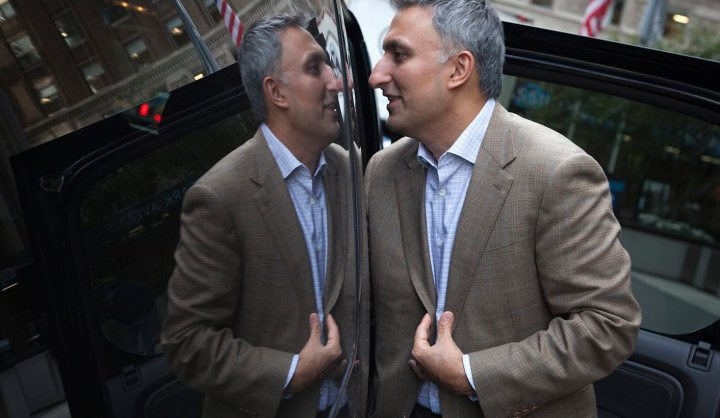Business Maverick
An IPO in 140 characters: Twitter prepares to go public – feel the burn

Last year, the equities market experienced the debacle of the Facebook IPO, in which a botched day on the trading floor left a bad taste in the mouth of those who had pumped $16 billion into the social media company. With that no doubt securely in mind, the folks behind Twitter are going for a somewhat different approach. Will it work? By RICHARD POPLAK.
You’ll recall that back in 2012, no one in these pages was particularly bullish on the then-looming Facebook IPO. You’ll recall that we insisted the stock was overvalued, that the deal seemed rushed, and that it would all end in tearful lawsuits. Yes, Facebook is ticking along, and the stock has nudged well north of the $38 that investors flocked to last year. But nonetheless, the company’s prospects seem unclear, young folks basically avoid the site as they would a poisoned bog haunted by flesh eating zombies, and bullshit still reigns as the leading prognosticator of Facebook’s so-called future. And yes, we know it’s bad manners, but regarding the future of tech stocks, we’re forced to quote ourselves, etiquette on these matters be damned:
“IPOs, and in particular tech IPOs, are complicated scams designed to make a very few people very rich very fast, and the rest of us look like assholes. The slightly longer answer is that most folks – including tech journalists – have no idea how to value a social networking company, because no one knows how social networking companies make money, even less so how they’re supposed to make money over time.”
This maxim has perhaps never been more pertinent to an IPO than it is to Twitter’s, which is coming up on November 7. How, exactly, does Twitter earn money? It doesn’t. Or rather, it doesn’t generate the sort of revenue, and certainly none of the profits, that should get anyone even mildly excited about its future prospects, assuming anyone is planning to go long on the stock. In the first nine months of this year, Twitter frittered away $133.9 million, while earning $422.2 million of revenue. That’s roughly double the loss and double the revenue on last year. Twitter, at least outside of China, has been a massively influential cultural moment. As of this writing, the service boasts 200 million users, and publishes half a billion tweets a day. But it faces the same conundrum Facebook did: how to convince serious investors that it can generate serious revenue for a serious run at longevity.
By the time Facebook hit the market, it was already a fossil. It was designed for the PC age, and had largely ignored the migration to mobile. The company focused on making the switch, and while its mobile platforms are now, um, world class, it has sacrificed the intangible cool factor for a vast increase in ad revenue. This may sound like an aesthetic complaint, but its not: by plying its users with adverts for fat busting drugs and other snake oil, it is losing frequent users while gaining revenue.
It’s the ultimate social media catch-22, and by no means has Facebook – current stock price be damned – solved the problem. It is an increasingly lousy product, and that lousiness will eventually start nibbling at the bottom line. Those nibbles will turn into a gorging, and Facebook will go the way of the Betamax.
Twitter is not a fossil – it is perhaps the most culturally relevant social media venue outside of China’s Weibo, despite the fact that it boasts only one fifth of Facebook’s users. Interestingly, if one were to compare its anticipated valuation – expected to be around $11 billion — with that of Facebook’s at the time of the IPO, Twitter is an $11 billion company. We know that, unlike Facebook, this valuation is considered somewhat on the low end of what investors can stomach – the $17 to $20 share price will probably nudge up in the days before the listing, and we’ll be looking at a $15 billion Twitter, roughly valuated at the same share price per user as Facebook.
Hmm.
The big winners in the IPO will certainly be co-founders Evan Williams and Jack Dorsey, who own 9 percent and 4 percent respectively (in two weeks time, Williams will be a billionaire, while Dorsey will merely be astonishingly rich). Private equity mogul Rizvi Traverse owns 15.6 percent, having bought up swathes of the joint on the private market. JPMorgan owns 9 percent, Peter Fenton of Benchmark Capital Partners owns 5.6 percent, and on she goes.
Learning from Facebook, the Twitter gamble is a much smaller one. The stock price is lower, the valuation is more modest, and with only 70 million shares on the dock, aiming to raise about $1.4 to $1.6 billion, it shouldn’t crash the New York Stock Exchange. What’s more, it is one of a number of IPOs this year, making it less of “the” story and more of “a” story. This year, 169 companies have gone public in the United States, raising over $45 billion – a big jump on 2012, and a return to the sort of activity that was commonplace prior to the crash.
Tech stocks are the crack high of the investment industry – they provide fancy short to medium returns, providing a 30 day boost of about 30 percent, and a total average return of 47 percent, assuming your fund manager knows when and why to sell. Most don’t. Which means tech stocks remain and incredibly tricky long-term bet, a fact that Twitter will do nothing to change.
So, expect more advertising in your free Twitter feed, an exchange that on paper is perfectly fair for a free service, but in practice doesn’t work out so good. Users like getting a free service for nothing, and while there’s no question that Twitter’s founders and employees deserve compensation, the fact that several of them will become billionaires remains a scam. Down the line, lots and lots of investors will get burned. Like the pithy 140 characters that comprise a Tweet, if you’re betting on the company, bet short. No one loves a tech penny stock, especially when it came out the box costing 17 bucks a pop. DM
Photo: Mike Gupta, Chief Financial Officer of Twitter, gets in a car as he leaves JPMorgan Chase before the firm’s IPO, in New York, October 25, 2013. Twitter Inc has set a relatively modest price range for its closely watched initial public offering, but some financial advisers say their clients are not clamoring to invest in the social media phenomenon. REUTERS/Carlo Allegri

















